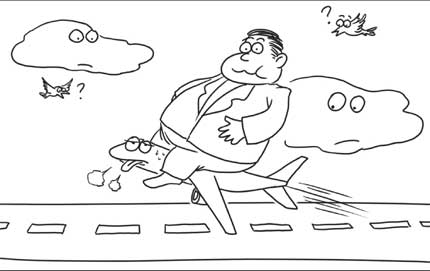Fat flyers impose extra fuel costs on everyone
- By Peter Singer
 0 Comment(s)
0 Comment(s) Print
Print E-mail Shanghai Daily, March 14, 2012
E-mail Shanghai Daily, March 14, 2012
 |
| [By?Zhou Tao/Shanghai Daily?] |
We are getting fatter. In Australia, the United States, and many other countries, it has become commonplace to see people so fat that they waddle rather than walk. The rise in obesity is steepest in the developed world, but it is occurring in middle-income and poor countries as well.
Is a person's weight his or her own business? Should we simply become more accepting of diverse body shapes? I don't think so. Obesity is an ethical issue, because an increase in weight by some imposes costs on others.
I am writing this at an airport. A slight Asian woman has checked in with, I would guess, about 40 kilograms (88 pounds) of suitcases and boxes. She pays extra for exceeding the weight allowance. A man who must weigh at least 40 kilos more than she does, but whose baggage is under the limit, pays nothing. Yet, in terms of the airplane's fuel consumption, it is all the same whether the extra weight is baggage or body fat.
Tony Webber, a former chief economist for the Australian airline Qantas, has pointed out that, since 2000, the average weight of adult passengers on its planes has increased by two kilos. For a large, modern aircraft like the Airbus A380, that means that an extra US$472 of fuel has to be burned on a flight from Sydney to London. If the airline flies that route in both directions three times a day, over a year it will spend an additional US$1 million for fuel, or, on current margins, about 13 percent of the airline's profit from operating that route.
Webber suggests that airlines set a standard passenger weight, say, 75 kilos. If a passenger weighs 100 kilos, a surcharge would be charged to cover the extra fuel costs. For a passenger who is 25 kilos overweight, the surcharge on a Sydney-London return ticket would be US$29. A passenger weighing just 50 kilos would get a discount of the same amount.
Another way to achieve the same objective would be to set a standard weight for passengers and luggage, and then ask people to get on the scales with their luggage. That would have the advantage of avoiding embarrassment for those who do not wish to reveal their weight.
Friends with whom I discuss this proposal often say that many obese people cannot help being overweight - they just have a different metabolism from the rest of us. But the point of a surcharge for extra weight is not to punish a sin, whether it is levied on baggage or on bodies. It is a way of recouping from you the true cost of flying you to your destination, rather than imposing it on your fellow passengers. Flying is different from, say, healthcare. It is not a human right.
One size affects all
An increase in the use of jet fuel is not just a matter of financial cost; it also implies an environmental cost, as higher greenhouse gas emissions exacerbate global warming. It is a minor example of how the size of our fellow citizens affects us all. When people get larger and heavier, fewer of them fit onto a bus or train, which increases the costs of public transport. Hospitals now must order stronger beds and operating tables, build extra-large toilets, and even install extra-large refrigerators in their morgues - all adding to their costs.
Indeed, obesity imposes a far more significant cost in terms of healthcare more broadly. Last year, the Society of Actuaries estimated that in the United States and Canada, overweight or obese people accounted for US$127 billion in additional healthcare expenditure. That adds hundreds of dollars to annual healthcare costs for taxpayers and those who pay for private health insurance. The same study indicated that the costs of lost productivity, both among those still working and among those unable to work at all because of obesity, totaled US$115 billion.
These facts are enough to justify public policies that discourage weight gain. Taxing foods that are disproportionately implicated in obesity - especially foods with no nutritional value, such as sugary drinks - would help. The revenue raised could then be used to offset the extra costs that overweight people impose on others, and the increased cost of these foods could discourage their consumption by people who are at risk of obesity, which is second only to tobacco use as the leading cause of preventable death.
Many of us are rightly concerned about whether our planet can support a human population that has surpassed seven billion. But we should think of the size of the human population not just in terms of numbers, but also in terms of its mass. If we value both sustainable human well-being and our planet's natural environment, my weight - and yours - is everyone's business.
Peter Singer is Professor of Bioethics at Princeton University and Laureate Professor at the University of Melbourne. "Copyright: Project Syndicate, 2012.www.project-syndicate.org





